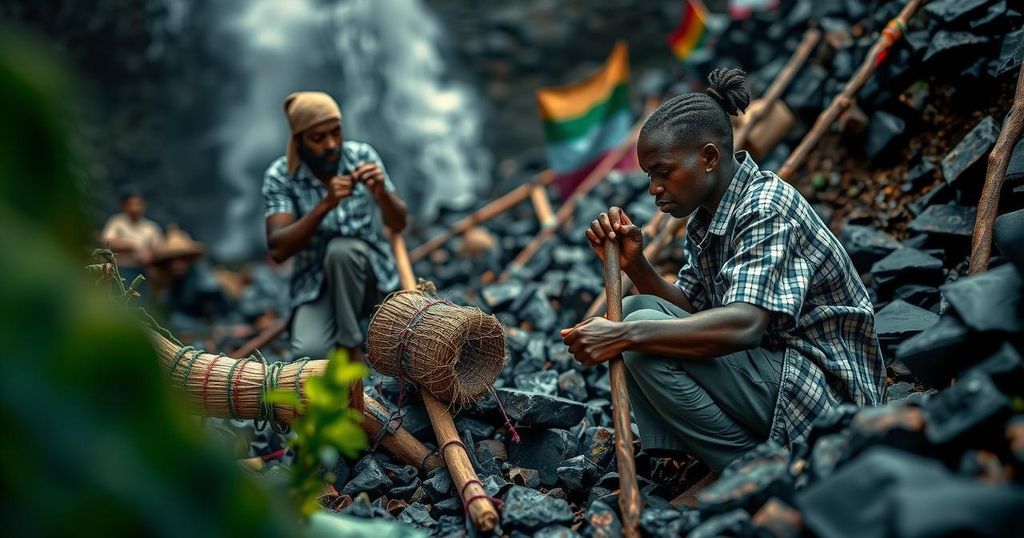Challenges Faced by Artisanal Miners in the DRC: A Call for Reform

Artisanal mining in the DRC is vital for local economies, providing jobs and raw materials. However, despite government promises over the past 20 years, there has been minimal formalization or improvement in working conditions, leaving many miners at risk of health hazards due to unsafe practices and exposure to toxic and radioactive materials. Urgent reforms are needed to enhance miners’ welfare and safety.
Artisanal mining in the Democratic Republic of Congo (DRC) constitutes approximately 10-20% of the nation’s copper and cobalt production. Despite the significant role of artisanal miners in the local economy, their working conditions remain perilous, with numerous health and safety hazards persisting largely unaddressed. In a commitment made in 2002, the DRC government vowed to formalize the artisanal mining sector to facilitate a transition towards semi-industrialization. However, after more than two decades, minimal progress has been realized. Within the Katanga region, it is estimated that around 200,000 individuals engage in artisanal mining, laboring in treacherous environments with basic hand tools, while enduring severe risks despite governmental assurances of improvement. Following the disbandment of the state-owned mining enterprise Gécamines in 2002, the DRC’s government expressed intentions to provide a framework for such formalization, yet nearly all mineral deposits remain under the control of industrial entities. Efforts to designate artisanal mining zones, as stipulated by the 2018 Mining Code, have not yet materialized. The World Bank highlights that artisanal mining is a critical source of income for an estimated 10 million people in the DRC, contributing to a significant portion of national production. However, many artisanal miners often find themselves operating illegally, moving from site to site and encroaching upon legally designated areas. According to Frédéric Malu, who operates CENADEP—an NGO dedicated to supporting artisanal miners—while temporary provisions have been established, they fail to create genuine artisanal mining zones, allowing operations only in areas owned by corporate entities. Furthermore, mining cooperatives struggle to acquire necessary capital to invest in the tools required for semi-industrialization. In 2019, the DRC government took steps to formalize the sector with the creation of the Entreprise générale du cobalt (EGC), although effective implementation of safeguards and improved working conditions for artisanal miners has yet to be realized. Allocations of the initial cooperative areas are insufficient to meet the labor demands of the local population. Artisanal mining operations also expose workers to significant health risks, particularly as they commonly labor in poorly supported tunnels without any safety equipment. Concerns regarding radioactive elements found in copper and cobalt ores are prevalent, posing health threats to the miners and potential environmental risks to surrounding water sources. Notably, shipments from certain production projects have been returned from South Africa due to unacceptable radiation levels. Expert analyses indicate that uranium and thorium may be present in ore, raising alarms regarding the possible ramifications for both the miners and local ecosystems. Limited studies have revealed a troubling rise in cancer cases among residents in mining communities, primarily affecting children in mining families. The environmental and health risks associated with artisanal mining go beyond individual miners, as contaminants can permeate water supplies and agricultural land. Experts advocate for comprehensive health and safety training for miners to enable them to protect themselves against the associated dangers. In summary, despite governmental promises aimed at safeguarding and formalizing the artisanal mining sector in the DRC, the situation for these miners remains grim as progress is stalled and numerous risks are pervasive. Effective solutions will require a concerted effort to improve their working conditions and address the health hazards inherent in artisanal mining practices.
Artisanal mining is a critical component of the DRC’s economy, where significant amounts of copper and cobalt are extracted informally. This sector employs millions of individuals, yet it is characterized by extreme safety and health risks. Governments and organizations have attempted to implement formal regulations to improve conditions, but actual implementation has lagged, leaving many artisanal miners in precarious situations. Understanding the ongoing challenges faced by these miners sheds light on the broader implications for health, safety, and economic stability in the region.
The plight of artisanal miners in the DRC highlights the urgent need for governmental and organizational intervention to fulfill promises of reform and ensure improved health and safety standards. While artisanal mining plays a vital role in the economy, the continued disregard for miners’ welfare and the environment poses significant risks that must be addressed promptly and effectively to safeguard the future of both the labor force and the regions impacted.
Original Source: news.mongabay.com








